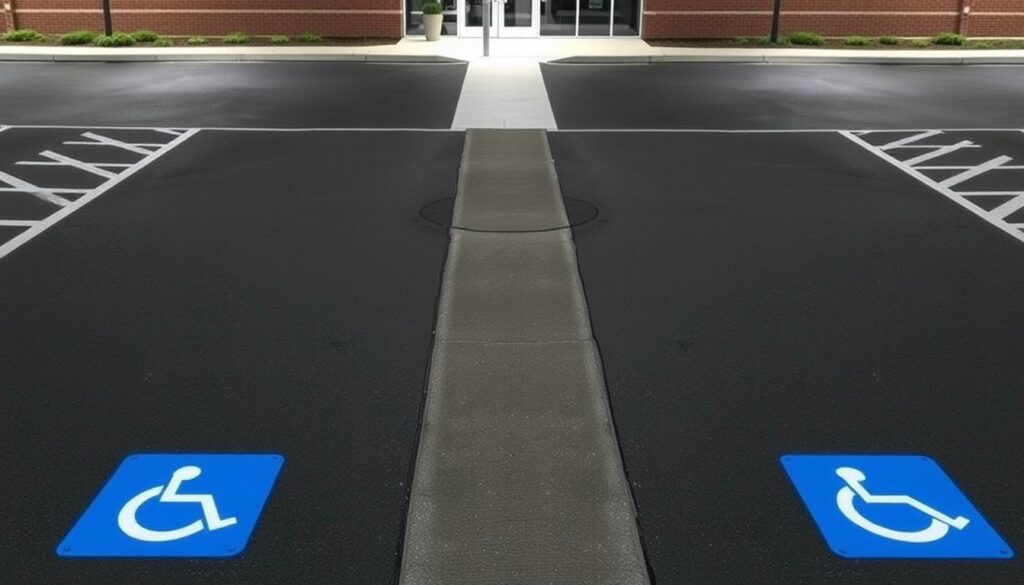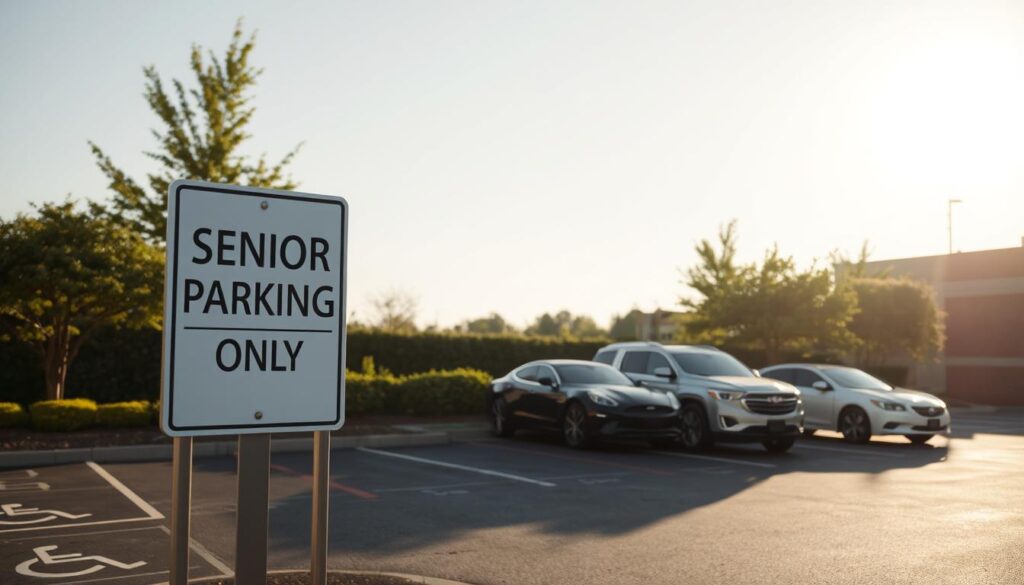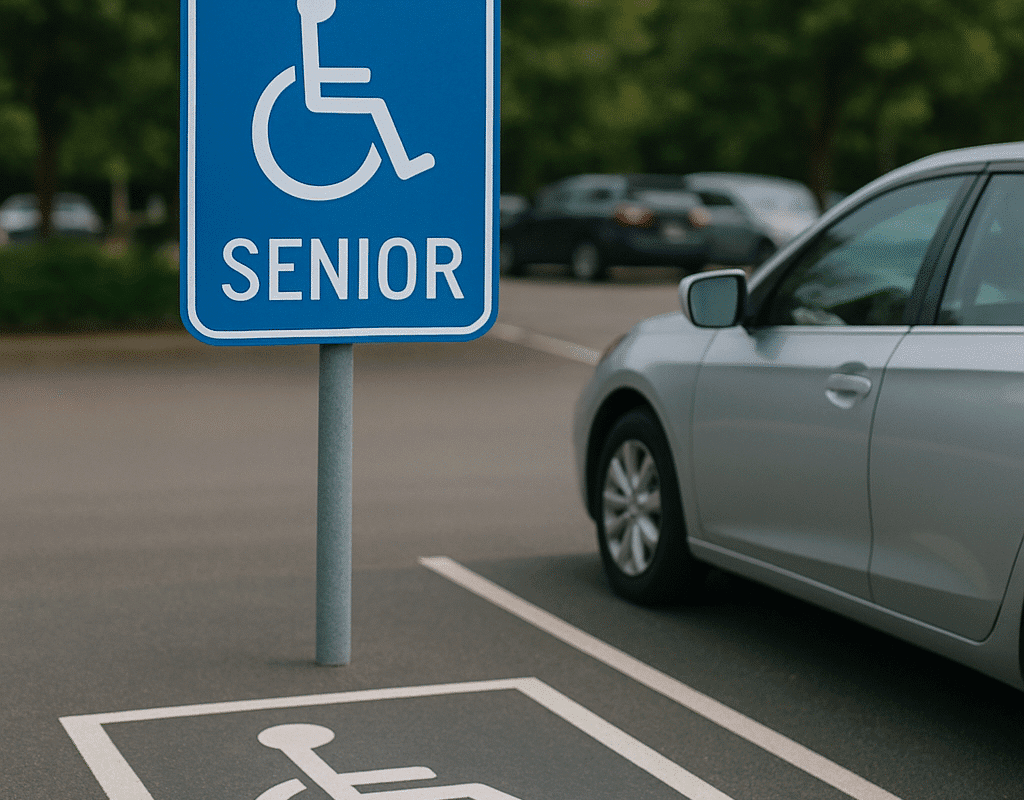I have grown to understand the value of senior-designated parking as I negotiate the challenges of aging. For many, having faster access to retail malls, medical facilities, and other vital services makes these designated areas more than just a convenience—they are a necessity.

According to my experience, a senior’s everyday life can be much improved by being aware of the advantages and requirements for senior parking places. These areas are made to be more accessible; they frequently have wider aisles for simpler movement and are situated nearer to building entrances.
Key Takeaways
- For senior citizens, senior parking spaces provide improved accessibility.
- Convenient places are usually where these dedicated areas are found.Although eligibility requirements differ, elderly and people with disabilities are typically the only ones eligible.
- Seniors’ daily lives can be improved by being aware of the advantages.Senior parking spots make shopping or receiving medical treatment more convenient and stress-free.
What You Need to Know About Senior Parking Spaces
Both parking facility managers and seniors must be aware of senior parking designations. Convenient and accessible parking options are becoming more and more necessary as our population ages.
Senior parking spots are usually broader to allow for easy access and are positioned closer to building entrances. For elderly people who might struggle with mobility or long-distance walks, this convenience is crucial.
Defining Senior Parking Designations
Parking spots designated for senior citizens are known as senior parking designations. These areas are intended to make it simpler for elders to access facilities, encouraging their independence and mobility.
Senior parking spots are typically clearly identified because to prominent signage and markings designating their status.
How Senior Parking Differs from Handicapped Parking
Although providing accessibility is the goal of both senior and disabled parking, their functions are distinct. Senior parking is for older people, regardless of their physical capabilities, while handicapped parking is for people with disabilities.
Because it guarantees that both groups have access to parking that suits their individual needs, this differentiation is crucial.

My Experience with the Benefits of Designated Senior Parking
Personally, I have found designated senior parking to be incredibly beneficial. The proximity to entrances and the extra space provided have made a significant difference in my daily activities.
Using senior parking has allowed me to maintain my independence and continue to participate in community activities without the challenges associated with finding parking further away.
Eligibility and Requirements for Senior Parking Spaces
Understanding the eligibility criteria for senior parking spaces is crucial for those looking to benefit from this convenience. As our society ages, the demand for exclusive parking for seniors has grown, leading to the establishment of specific guidelines and regulations.

Age Requirements and Verification Methods
The age requirement for elderly parking spots varies by jurisdiction, but it is typically set at 65 years or older. To verify age, seniors may need to provide identification, such as a driver’s license or state ID, to prove they meet the age requirement.
Some jurisdictions may also require additional documentation, such as proof of residency or a physician’s note in certain cases, to validate the need for senior parking privileges.
How to Apply for Senior Parking Privileges
To apply for exclusive parking for seniors, individuals typically need to submit an application to their local transportation or motor vehicle department. The application process may involve filling out a form, providing required documentation, and possibly paying a fee.
It’s essential to check with local authorities for specific requirements, as the process can vary significantly.
Documentation I Keep Handy When Using Senior Parking
When using elderly parking spots, it’s a good idea to keep the necessary documentation easily accessible. This may include a senior parking permit or placard, identification, and any other relevant documents required by local regulations.
Locating and Identifying Senior Parking Spaces
With age, mobility can become a concern, making it essential to locate senior-friendly parking areas. Senior parking spaces are designed to offer convenience and accessibility, and being aware of their locations can significantly enhance the overall experience for seniors visiting various public venues.
Common Venues Offering Senior Parking
Senior parking is typically available at locations that are frequently visited by seniors, such as shopping malls, medical facilities, and retirement communities. These venues understand the importance of providing senior-friendly parking to ensure that older adults can access their services comfortably.
- Shopping malls and retail centers
- Medical facilities and hospitals
- Retirement communities and senior living facilities
- Public libraries and community centers
Recognizing Senior Parking Signage and Markings
To identify senior parking spaces, it’s crucial to recognize the specific signage and markings used. These spaces are often marked with clear signs indicating that they are reserved for seniors, and the parking bays may be painted with distinctive colors or symbols to highlight their designation.
Being able to identify these markings can help seniors quickly locate the parking areas designed for them.
Apps and Resources I Use to Find Senior Parking
In today’s digital age, there are various apps and online resources available that can help locate senior parking spaces. Some of these resources include parking locator apps, senior-focused community websites, and maps that highlight accessible parking areas.
- Parking locator apps like ParkMobile or SpotHero
- Senior community forums and websites
- Accessibility-focused mapping services
Utilizing these resources can make it significantly easier for seniors to find convenient parking options when out and about.
Accessibility Features That Make Senior Parking Spaces Convenient
Senior parking spaces are designed with a focus on accessibility and convenience, incorporating various features to facilitate ease of use. As I have observed, these spaces are not just mere designations on a parking lot map; they are thoughtfully laid out areas that consider the needs of seniors.
Physical Design Elements That Help Mobility
The physical design of senior parking spaces includes wider parking bays and access aisles that allow for easier maneuverability, especially for those using mobility aids like wheelchairs or walkers. “These design elements are crucial for ensuring that seniors can safely and comfortably access their vehicles,” as noted by accessibility experts. The inclusion of ramps and curb cuts further enhances mobility by providing a smooth transition between the parking area and the sidewalk.
Strategic Placement Near Entrances and Services
Senior parking spaces are typically located near entrances and essential services, reducing the distance that seniors need to walk. This strategic placement is a significant convenience, especially for those with mobility issues. For instance, being close to the main entrance of a shopping mall or a healthcare facility can make a substantial difference in the overall shopping or visit experience.
Weather Protection and Safety Considerations
Weather protection is another critical aspect of senior parking spaces. Some parking areas are designed with covered or sheltered parking for seniors, protecting them from the elements. Safety considerations, including adequate lighting and security measures, are also integral to the design of these parking spaces.
Lighting and Security Features
Proper lighting is essential for safety, and senior parking areas often have enhanced lighting to reduce the risk of accidents or criminal activity. Security features, such as surveillance cameras and emergency call systems, further contribute to a secure environment. As I have experienced, these features collectively provide peace of mind for seniors and their families.
By incorporating these accessibility features, senior parking spaces significantly enhance the parking experience for seniors, making it more convenient and secure.
Embracing the Convenience of Senior Parking Privileges
As I’ve explored the world of senior parking, it’s clear that designated parking for seniors offers a range of benefits designed to make life easier for older adults. By understanding the eligibility criteria and locating these convenient spaces, seniors can significantly enhance their parking experience.
I have found that appreciating the accessibility features of senior parking spaces is crucial. These spaces are designed to provide convenience and ease, making it simpler for seniors to access various amenities and services. With designated parking for seniors, older adults can enjoy a more relaxed and stress-free experience when out and about.
By taking advantage of senior parking privileges, seniors can maintain their independence and mobility. I encourage seniors to explore the benefits of designated parking for seniors and make the most of the convenience and accessibility these spaces provide.
FAQ
What are the typical age requirements for senior parking spaces?
The age requirements for senior parking spaces vary by state or locality, but generally, seniors are eligible at the age of 62 or 65. It’s essential to check with local authorities for specific age requirements.
How do I verify my age for senior parking privileges?
To verify your age, you typically need to provide a valid government-issued ID, such as a driver’s license or state ID, which shows your date of birth.
Can I use senior parking spaces if I don’t have a disability placard?
Yes, senior parking spaces are generally available to seniors who meet the age requirement, regardless of whether they have a disability placard. However, some facilities may have specific rules, so it’s best to check ahead of time.
Where can I typically find senior parking spaces?
Senior parking spaces are commonly found at shopping malls, medical facilities, retirement communities, and other public venues that cater to seniors.
How can I identify senior parking spaces?
Senior parking spaces are usually marked with clear signage indicating that they are reserved for seniors. The spaces may also be designated with specific markings or colors.
Are there any apps or resources that can help me locate senior parking?
Yes, there are several parking apps and websites that can help you find senior parking spaces, such as ParkMobile or SpotHero, which often include filters for senior or accessible parking.
What are some of the accessibility features of senior parking spaces?
Senior parking spaces often feature wider parking areas, ramps, and proximity to entrances and essential services, making it easier for seniors to navigate.
Are senior parking spaces covered or protected from the weather?
Some senior parking spaces, especially those in structured parking facilities, may offer weather protection. However, this can vary depending on the location and design of the parking area.
How do I apply for senior parking privileges?
To apply for senior parking privileges, you typically need to submit an application to your local parking authority or the specific facility where you want to park, along with the required documentation, such as proof of age.
What documentation should I keep handy when using senior parking?
It’s a good idea to keep your valid ID, proof of age, and any other relevant documentation, such as your senior parking permit, readily available when using senior parking spaces.




